Nothing could have prepared me for the day my mom wouldn’t wake up. And nothing could have prepared her for what life would be like when she did.
One weekend back in 2014, my mother was staying with my kids while my husband and I were out of town. When my 11-year-old called and told me, “Mamaw won’t wake up,” I assumed she was just really tired from dealing with three little ones the night before. Just to be safe, I called my dad to go check on her, and when he did, she was unresponsive. She was rushed to the hospital where they discovered that an aneurysm had burst in her brain, and we were told she had a five percent chance of survival. Thankfully, a skilled neurosurgeon on staff was able to save her life by clipping the aneurysm, but the blood on her brain had affected her sense of balance as well as her ability to walk. She went through months of rehab until she was finally strong enough to come home and live with my dad, but she still couldn’t stand up on her own or walk across the room without help. And she certainly couldn’t drive.
It took a few weeks for my mom to realize that her independence was essentially gone. At that point, she became frustrated and depressed because she could no longer do the things she used to, and she felt like a burden to us. My father and I tried to reassure her that we were happy to help because we were simply thankful she had survived, but we didn’t have the words to make her comprehend it. She finally gained strength to walk on her own, but only after many months of tears and sadness. I remember wishing she could express her feelings to someone who was trained to listen— someone like a professional counselor who would know just what to say.
Fast forward six years, and I’m seeing all kinds of online therapy services that would have been helpful for all of us. Largely due to the COVID-19 pandemic, many doctors including mental health experts are offering telehealth services that allow patients to get help without leaving their homes. This is great to see since mental wellness can be a struggle for the general population, but especially because depression is so prevalent in seniors and often goes unrecognized and untreated. I’ve been browsing these online resources and evaluating which ones seem the most helpful, because I’d certainly recommend this type of service if any of my loved ones need therapy in the future.

Signs of depression in seniors
According to the American Stroke Association, approximately one third of stroke victims such as my mother are subject to Poststroke Depression (PSD). Research from the Center for Disease Control also shows that between one and five percent of all seniors living at home suffer from major depression, rising to 14 percent for those receiving home health care or living in an assisted living facility. Eric Lenze, MD, a Washington University geriatric psychiatrist at Barnes-Jewish Hospital, says late-life depression is a condition that some have had for their entire lives and continues in older age, while for others, it’s a new disorder that doesn’t set in until facing the challenges and stresses that come with aging, such as social isolation, disability, and grief.
“Depression is very disabling,” Lenze said in a 2013 article posted by Washington University School of Medicine— “And in older patients, it can even cause problems with memory and attention and can greatly increase the disability that accompanies medical problems such as heart disease. It also increases a person’s risk of death, either from suicide— which is more common in older people than in any other age group— or by making age-related illnesses such as heart disease or cancer more deadly.”
The following behaviors in seniors should raise a red flag to seek a mental evaluation by a professional:
- Persistent sadness
- A decrease in socialization
- Loss of interest in activities they usually love
- Excessive worrying
- Irritability
- Feeling helpless or hopeless
- Changes in appetite
- Sleeping too much or trouble falling asleep
- Crying spells
- Trouble focusing
- Trouble remembering things
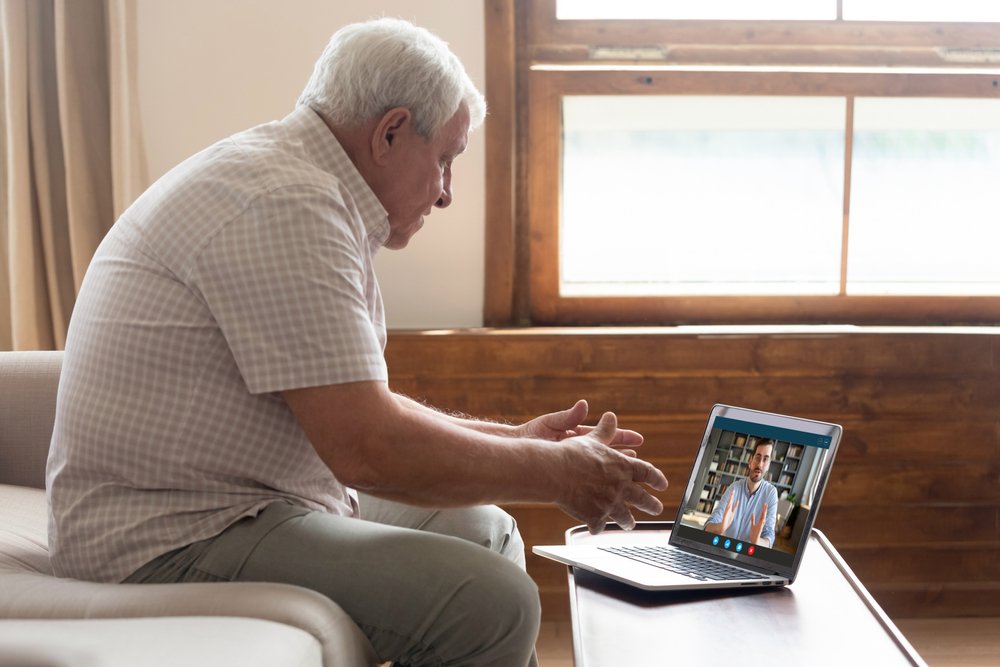
Is online mental health counseling right for my loved one
When my mom was having such a tough time, I would have given anything for her to be able to open her phone or laptop and talk to a friendly face who could help her deal with her feelings. Today, I’m happy there are so many virtual therapy options for seniors feeling lonely at home. Many older adults who are not technology savvy may be apprehensive to get virtual help, but Melinda Lantz, vice chair and chief of geriatric psychiatry at Mount Sinai Beth Israel and president of the American Association for Geriatric Psychiatry, believes that if a loved one is showing signs of depression, even an unfamiliar type of therapy is better than none.
In a 2019 interview with the Wall Street Journal, Lantz said that because loneliness can increase depression risk and worsen anxiety, cognitive decline and behavioral disturbances, “programs that increase interpersonal interaction of any kind, virtual or in person, are extremely valuable.”
It’s important to note, however, that while online therapy can be very beneficial, it should be reserved for non-emergency situations. If a senior is experiencing severe mental health problems such as suicidal thoughts, it’s crucial to seek clinical in-person help right away.
The pros and cons of e-counseling
Telemedicine is very common today and ideal for a lot of reasons. But it’s worth it to weigh the advantages and disadvantages of online mental health services with your loved one to help them understand what to expect.
Benefits
- There’s no need to leave home. This would have been very helpful for my mom since it was hard for her to get dressed and ready to go when her balance was off. It’s also valuable for seniors who don’t drive because they don’t have to find a ride from family or friends.
- It requires a shorter time commitment. Less time in the car means less exhaustion, especially for those dealing with chronic pain.
- There’s less chance of getting sick. Seniors who have compromised immune systems, particularly during the COVID-19 pandemic, don’t have to risk having direct contact with sick patients by going into a busy office.
- It provides much-needed social interaction. Heidi Donald, Licensed Clinical Social Worker at Renew Mind and Body Wellness in Columbia, Illinois says loneliness makes depression worse, so face-to-face interaction is always a good thing— “Since the beginning of Covid, Facetime has allowed seniors to stay connected to their families, and that has been a saving grace for a lot of really sad people,” says Donald. “So even if it is through a screen, talking to a counselor about concerns can provide that human connection needed to help seniors overcome depression.”
- It may be less embarrassing. Some seniors like the idea of avoiding running into someone they know in a waiting room.
Disadvantages
- Technology can be intimidating. Some older adults don’t even have smartphones, much less know how to use a virtual meeting app. Those living in assisted living or nursing facilities may need staff to help them, while those living at home may need help from a family member or home healthcare provider.
- Older adults may be leary of the World Wide Web. Even though my research shows that every online counseling tool follows HIPAA regulations and makes security a top priority, some seniors feel uncomfortable sharing personal information online.This may also be a barrier when it comes time to use a credit card to pay for services.
- Dependable Internet service is a must. Online face-to-face discussions require a fast connection to avoid lagging, and some elderly Internet subscribers only use the web to check their email or Facebook. They may have to upgrade their service plan to get the most out of online therapy.
- Insurance may not pay. Many insurance companies have expanded their telehealth therapy coverage during the Covid-19 pandemic, but if mental health services are not covered in a client’s general plan, it won’t be covered for online service unless it’s been prescribed by a doctor. In many cases, insurance companies request to see a mental disorder diagnosis as well as a treatment plan before covering mental health services.
What to look for in an online mental health site
Donald says there are several things to look for when evaluating which virtual counseling services would best meet the needs of older adults. First, a therapist should haveexperience with seniors and be able to help with depression, anxiety, grief, disabilities, and other common aging concerns.
“Seniors are dealing with physical issues that greatly impact their mental health,” stated Donald— “Their brains are changing, they feel more pain, they lose control over their bodies, and they lose a lot of independence. All of those things are accompanied by strong emotions, and a counselor who is trained to address these issues will have the tools to help seniors handle those emotions better.”
Another thing to look for in a good telehealth site is usability and communication options. Many seniors have trouble with new technology, so the patient should feel comfortable when logging in for their sessions. As far as how often a senior can interact with their counselor, Donald doesn’t recommend a 24/7 option— “I’m not a fan of the option to constantly text back and forth. The point of therapy is to teach the client tools to handle their emotions on their own, so it’s really important to give them time to use those tools. They shouldn’t be contacting a therapist every moment they have a problem.”
The last thing to consider is cost. I know that my own parents are on a budget, so I would look for the most affordable mental health service for them. Donald agreed that affordability is a must. “It’s a huge relief that since Covid, many insurance providers have stepped up and agreed to pay for telehealth counseling,” said Donald, “Because when you limit mental health therapy to people who can pay for it out of pocket, you leave out a large portion of our population.”
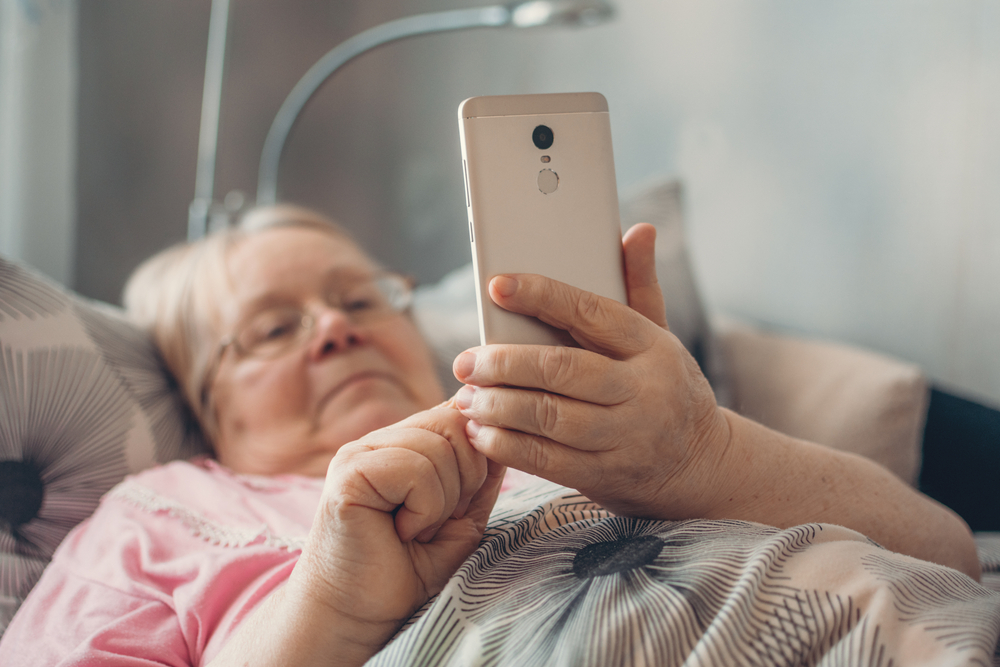
The best online mental health sites for seniors
I researched five sites that offer talk therapy with licensed providers, and rated them based on how likely I would be to recommend them to my own mother. Then I asked Heidi Donald how she would rate them for seniors in general, based on what she could tell without creating an account.
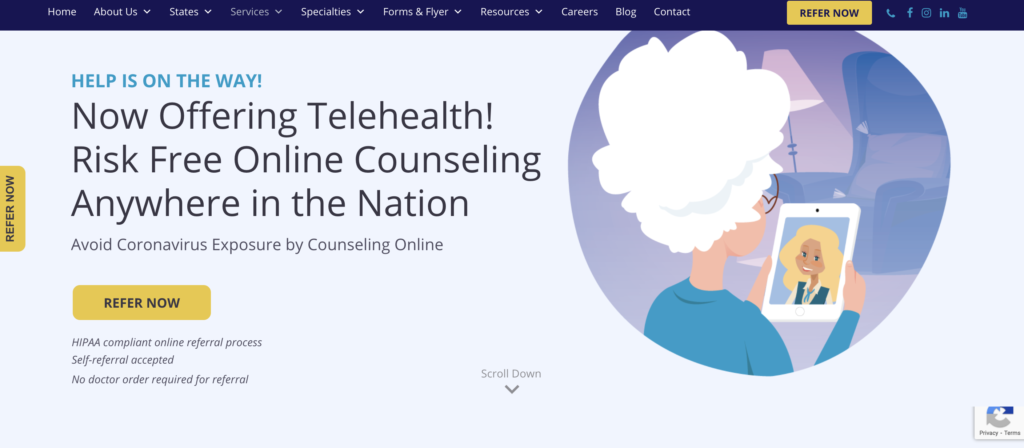
Blue Moon Senior Counseling
This was the only service I found that caters exclusively to seniors. Blue Moon Senior Counseling offers telehealth therapy services as well as in-home counseling in all 50 states, which could be an advantage if a loved one doesn’t respond well to online help.
Cost: Therapists at Blue Moon accept Medicare payments as well as PPO insurance. Out of pocket cost is $100 per session.
Therapist Experience: Blue Moon’s licensed clinical social workers hold masters’ degrees and have at least two years of supervised clinical experience. They specialize in therapy for seniors, including:
- Older adult depression
- Seniors and anxiety disorders
- Bereavement counseling
- Agoraphobia in older adults
- Coping with illness
- Senior isolation and loneliness
- Adjustment Disorders
Usability/Communication Options: After filling out a self-referral form about the patient’s location and living arrangements, Blue Moon runs Medicare eligibility and then has a counselor contact the patient within 24 hours. The service offers clients a variety of scheduled audio-video conferencing options including Facetime, Skype, and Zoom, which can be accessed via computer, smartphone or tablet.
My Rating: 10/10
I love knowing that therapists have specific experience with mental wellness for seniors, and that they are available for in-home appointments if needed. It’s also nice to know they accept Medicare and other insurance so clients don’t have to worry about expenses while getting the help they need.
Licensed Clinical Social Worker’s Rating: 10/10
“The fact that they list specific senior issues is really important, and I like that they offer scheduled face-to-face interaction. It’s also great that they accept insurance.”
Total Rating: 20/20
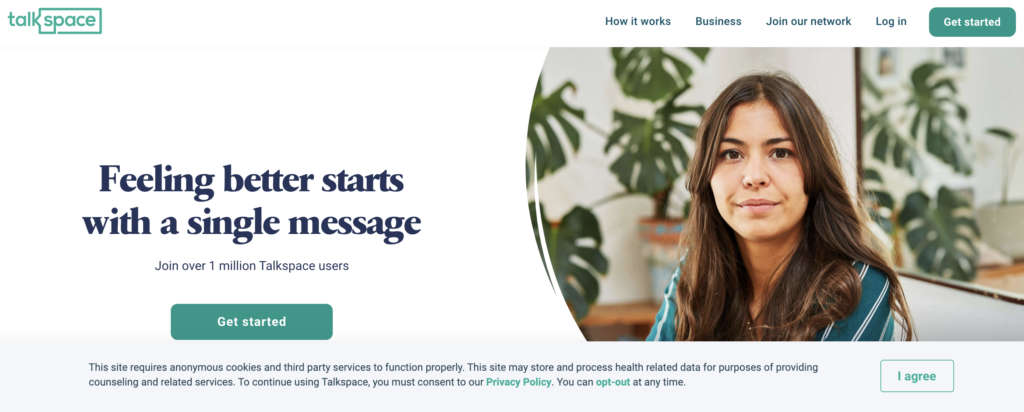
Talkspace
Talkspace caters to clients of all ages, so it’s hard to tell if therapists have specific training to address senior issues. They provide 24/7 access to connect with a licensed therapist daily via text, audio, or video, and also offer psychiatric services for people needing an evaluation for medication.
Cost: Plans start at $65 per week. They do not accept Medicare or Medicaid, but do accept a variety of other insurance carriers including Cigna, Optum, Premera, Blue Cross Blue Shield, and Humana. Talkspace offers a 10% discount for customers that commit to a 3-month plan and 20% for those that commit to 6 months.
Therapist Experience: Talkspace requires therapists to have logged over 3,000 hours of clinical experience in order to join their platform. If clients aren’t happy with their chosen therapist, there is no charge to select a different one. There is nothing that lists senior care anywhere on the site.
Usability/Communication Options: After checking insurance eligibility, the client fills out a brief assessment and then receives a list of recommended therapists. Talkspace has its own mobile app to use on iOS or Android, and reviewers say it’s easy to use for customers who aren’t technically savvy.
My Rating: 7/10
If I could be certain the therapists are skilled at treating mental wellness in seniors, this sounds like a helpful service since they offer text, phone, or video, and sometimes my mom prefers phone calls. But they don’t accept Medicare, and that’s what my parents use.
Licensed Clinical Social Worker’s Rating: 6/10
“They don’t list senior issues, and there’s that 24/7 ‘reach out whenever you need’ promise that isn’t always a good thing. I would also like it better if they accepted Medicare.”
Total Rating: 13/20
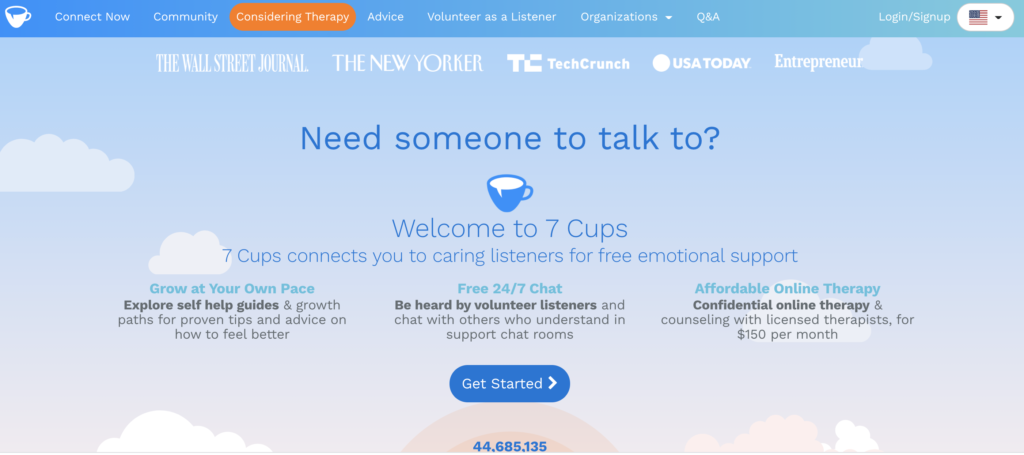
7 Cups
The 7 Cups site made me feel welcome as soon as I landed on it and read “We might be strangers on the surface, but underneath we’re just friends you haven’t met yet.” It doesn’t say anything specific about senior mental wellness, but it does offer a free 24/7 chat with trained volunteers and peers, as well as paid therapy sessions with professional counselors.
Cost: Free chat with trained volunteers, or $150 per month to work with a licensed counselor. 7 Cups does not accept insurance.
Therapist Experience: 7 Cups’ listing of therapists includes Licensed Professional Counselors, Psychologists, Licensed Psychoanalysts, and Clinical Social Workers, along with Therapists who specialize in marriage, substance abuse and more.
Usability/Communication Options: After creating an account, the client selects a topic to discuss from a list of options ranging from anxiety to relationships. They then choose to either pay to work with a therapist or simply enter a chat room with trained volunteers and other people dealing with similar issues. If the therapy option is chosen, the client answers more in-depth questions and then must provide a credit card number before moving forward.
There is no face-to-face interaction with therapists or volunteers. Users can type in the free chat room any time, or text or send audio or video messages to a counselor. Counselors will respond once or twice a day Monday through Friday.
My Rating: 8/10
A free chat would be a great asset for seniors who can’t afford online therapy, or who just need someone to validate their feelings while waiting for their next therapy appointment. My mom joined a Facebook group of other aneurysm survivors and really valued the ability to vent to or even help others who were going through what she was, so she might like a chat room like this. And while their paid service doesn’t offer a face-to-face connection that I think is so important, $150 per month is cheaper than several other online mental wellness providers — which is beneficial to those on a budget. I just wish I could tell if they offer specific help for seniors.
Licensed Clinical Social Worker’s Rating: 6/10
“I think for seniors, that face-to-face option needs to be there, but $150 per month is more affordable than other online providers. But chat rooms can get out of control quickly when not constantly monitored, so that may not be helpful.”
Total Rating: 14/20
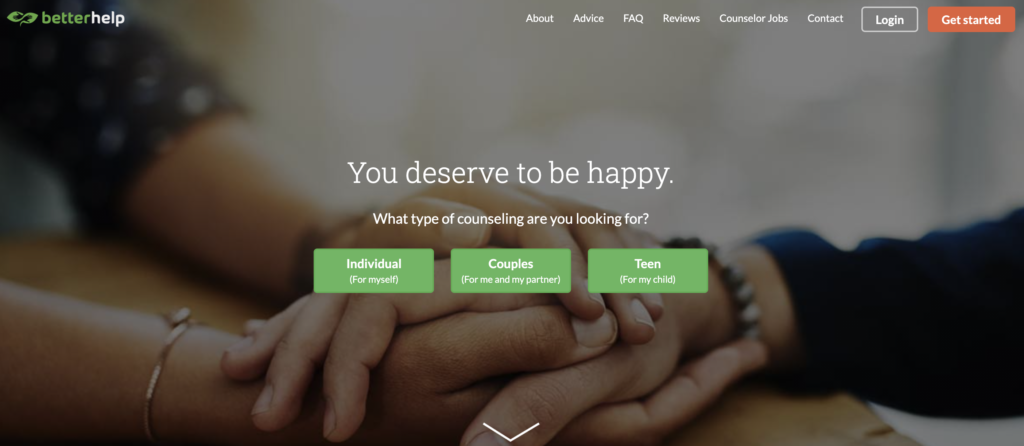
Betterhelp
Betterhelp boasts that it is the “largest online counseling service worldwide.” It offers a paid, easy-to-use interface for both desktop and mobile users via text messaging, live chat, phone conversations, and video conferencing. The service does not advertise to seniors, but it does do a thorough assessment to determine the age of the client before matching with a counselor.
Cost: The cost of counseling through Betterhelp ranges from $60 to $90 per week (billed every 4 weeks) and they do not accept insurance.
Therapist Experience: Betterhelp offers access to licensed, trained, experienced, and accredited psychologists (PhD / PsyD), marriage and family therapists (LMFT), clinical social workers (LCSW / LMSW), and board licensed professional counselors (LPC). After their credentials are checked, each potential provider must complete a case study exam given by a licensed clinician, and then is evaluated in a video interview. After this 4-5 week process, only 15 percent of applicants are hired.
Usability/Communication Options: Once a client has created an account and paid for service, he or she is matched with a therapist that can address their needs (this can take from a few hours to several days). Then, the client and counselor communicate in any of the following ways:
- 24/7 messaging; the client can type a message at any time with concerns and feelings. Since sessions aren’t scheduled, the counselor responds throughout the day and an email notification is sent to the client.
- Live chat sessions; after scheduling a session, the client logs in to the account for interactive text messaging.
- Scheduled phone or video calls
My Rating: 8/10
Without insurance, this service could be hard to afford. However, their counselors seem very qualified, and it’s nice that they offer so many methods of communication. I would feel more comfortable using this service if it listed senior care as a specialization.
Licensed Clinical Social Worker’s Rating: 8/10
“It’s nice that they are very selective with who they hire, and that they offer phone and video calls. But many patients can’t afford it without insurance.”
Total Rating: 16/20

Faithful Counseling
If your elderly family member is comforted by prayer, this service may be best for them. Faithful Counseling’s mental health professionals are practicing Christians who combine Biblical wisdom with clinical expertise to address client challenges. Counseling is available via text messaging, audio, or video.
Cost: Faithful Counseling charges from $60 to $90 per week (billed every 4 weeks) and they do not accept insurance.
Therapist Experience: The counselors of Faithful Counseling are licensed, trained, experienced, and accredited psychologists (PhD / PsyD), marriage and family therapists (LMFT), clinical social workers (LCSW / LMSW), or licensed professional counselors (LPC). They all have a Masters Degree or a Doctorate Degree and are qualified and certified by their state’s professional board. Each provider has at least 3 years and 1,000 hours of hands-on experience.
Each counselor has self-identified as a practicing Christian, shared their testimony prior to joining the platform, and has verified that their beliefs align with Faithful Counseling’s Statement of Faith.
Usability/Communication Options: Faithful Counseling is set up a lot like its parent company, Betterhelp. The client creates an account, pays for service, then is matched with a therapist who has similar spiritual or religious views along with experience addressing their needs. The client and counselor then communicate via:
- 24/7 messaging; the client can type a message at any time with concerns and feelings. Since sessions aren’t scheduled, the counselor responds throughout the day and an email notification is sent to the client.
- Live chat sessions; after scheduling a session, the client logs in to the account for interactive text messaging.
- Scheduled phone or video calls
My Rating: 9/10
My mom would have appreciated working with a faith-based counselor even if they weren’t trained specifically in elder care. We all prayed a lot during her recovery, and I think that’s pretty common among seniors coping with changes in their physical and mental well-being. The cost could be a lot for someone on a budget, so that would be my biggest concern.
Licensed Clinical Social Worker’s Rating: 9/10
“Seniors, especially those near the end of life, are relying very much on their faith to get through difficult times. Having qualified counselors who can include faith in their sessions is a good thing — as long as the client can afford the out-of-pocket cost.”
Total Rating: 18/20
Which online mental health service would I choose for my loved one?
So, which telehealth service would I have chosen had it been available after my mom’s stroke? I’d probably say Blue Moon since their therapists know how to help with depression in older adults, and they could have helped her with adjusting to the loss of her independence. I also like that they accept Medicare, so I know she would be able to afford the service. I hope that we don’t experience anything again like we did six years ago, but if we do, I’ll be armed with all the information I need to get her the help she deserves.

